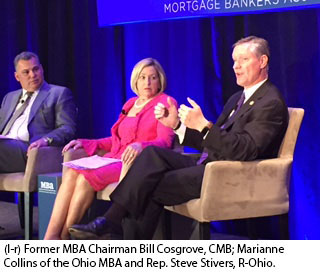
On Capitol Hill, Finding Solutions Amid Acrimony
WASHINGTON, D.C.–If the political atmosphere here in Washington seems a bit fractious, that’s because it is. But it doesn’t mean things are at a standstill.
“How we build relationships with our legislators is how we get things done,” said former MBA Chairman Bill Cosgrove, CMB, speaking here at the Mortgage Bankers Association’s National Advocacy Conference.
At the same time, acrimony cannot be ignored. The 2016 presidential election was one of the most divisive in history, coming on the heels of a polarizing eight years during the Obama Administration. The first five months of the Trump Administration has done nothing to alleviate those tensions.
Those tensions became evident even as Stephanie Cutter, former senior advisor to President Barack Obama and currently an analyst with CNN; and Corey Lewandowski, former campaign manager of Donald J. Trump for President Inc., gave frank assessments of what’s happening in Washington.
Lewandowski said Republicans have to deliver on their 2016 victories. “If the Republicans do not deliver on the things they promised–the rewrite of Obamacare, tax reform, immigration reform–then I think it will have repercussions for the Republican Party in November 2018,” Lewandowski said. “If the Republicans can’t get anything done, then it is possible that Democrats could regain control of the House in 2016.”
Lewandowski said Trump deserves and “A for effort” for trying to achieve his goals, but said he’s been hamstrung by his inability to work with Congress.
Cutter had a different view. “An ‘F’,” she said. “I’ve worked with two different people who knew how to act like a President; Trump has not figured that out yet. The sum of the President’s problem can be summed up in 140 characters. Every time his people try to send an effective message, he ruins it with a series of tweets.”
Lewandowski said many of the individuals in the Trump Cabinet are “brilliant” people who can get the job done. “He empowers them to run their own departments,” he said. “He’s not telling Steve Mnuchin how to run the Treasury Department; he lets Steve run the department. I think that’s a good management style…a number of these people have true management experience, and they are the people who are going to transform the government.”
 Rep. Steve Stivers, R-Ohio, chairman of the National Republican Congressional Committee, said despite the acrimonious atmosphere on Capitol Hill, “there are a lot of good Republicans and good Democrats out there who are working together to find the right solutions on issues.”
Rep. Steve Stivers, R-Ohio, chairman of the National Republican Congressional Committee, said despite the acrimonious atmosphere on Capitol Hill, “there are a lot of good Republicans and good Democrats out there who are working together to find the right solutions on issues.”
Stivers, a member of the House Financial Services Committee, said the committee has had a busy spring, marking up bills that would revamp the Dodd-Frank Act and the National Flood Insurance Program. He said members are also working on a number of individual bills as well. “We’re moving forward on a lot of little things that matter to people,” he said.
For example, on June 20, Stivers introduced H.R. 2948, the SAFE Transitional Licensing Act (https://www.congress.gov/bill/115th-congress/house-bill/2948/text), which would amend the SAFE Mortgage Licensing Act of 2008 to provide a temporary license for loan originators transitioning between federally-insured depositories and non-depositories, as well as across state lines.
Stivers said the bill, introduced with Reps. Joyce Beatty, D-Ohio, Kyrsten Sinema, D-Ariz., and Bruce Poliquin, R-Maine, would require states to issue a transitional license to individuals who are already employed by a financial institution and are a registered loan originator. These individuals would be able to continue originating loans for 120 days when they move from one type of lender to another, or move to a new state.
Stivers said the bill, which has MBA support, is similar to legislation that passed the House in the 114th Congress. “These aren’t partisan issues, and it’s a shame when they do become partisan issues,” he said.
MBA, through its grassroots advocacy arm the Mortgage Action Alliance, issued a Call to Action this week in support of the Stivers bill (http://action.mba.org/mba/app/write-a-letter?0&engagementId=368533).
“To convince congressional leaders to quickly advance this important bill as a free-standing measure through the Financial Services Committee and to the House floor, we must increase bipartisan support for the proposal,” said MBA Senior Vice President of Legislative and Political Affairs Bill Killmer.
Stivers added with key debates coming up on GSE reform and other issues of concern to MBA members, he expects a lot of input from constituents. He said members of Congress enjoy “simple grassroots communication.”
“You should make an effort to get to know your members of Congress, especially when you’re not asking for something,” Stivers said. “Make an appointment once or twice a year just to come in reintroduce yourself and discuss issues.”
Marianne Collins, executive director and COO of the Ohio Mortgage Bankers Association and the New York Mortgage Bankers Association, said at the state level in particular, such communication is particularly effective.
“You have to establish that relationship,” Collins said. “You have to be honest with them, so that they can come to rely on you as an honest source for information to help them make the right decisions.”
Collins said there are “nuances” in establishing various relationships with members of the House and Senate. “Many of the people who I work with in Congress today I started working with at the state level,” she said. “The fact that I began those relationships early in their careers makes our communication with them more effective now.”
